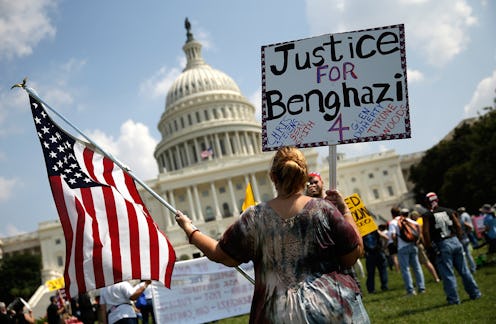News
Benghazi Suspect Faces U.S. Prosecution
The alleged ringleader behind the September 2012 attacks on U.S. diplomatic compounds in Benghazi, Ahmed Abu Khatalla, pleaded not guilty Saturday in a federal court. After being captured by U.S. military nearly two weeks ago, Khatalla arrived in Washington, D.C., Saturday morning via a helicopter ride from a Navy warship. He was indicted by a federal grand jury on the charge of conspiracy by providing material support and resources to terrorists that resulted in the death of four Americans. According to The New York Times, the proceeding lasted just 10 minutes.
Attorney General Eric Holder said in a statement:
Now that Ahmed Abu Khatallah has arrived in the United States, he will face the full weight of our justice system. We will prove, beyond a reasonable doubt, the defendant’s alleged role in the attack that killed four brave Americans in Benghazi.
The 43-year-old Libyan militia general was initially charged in a federal complaint filed by the DOJ in 2013. Federal authorities had reportedly identified about a dozen suspects in connection with the fatal 2012 Benghazi attack; however, Khatalla is the first suspect to brought into U.S. custody. The DOJ said Khatalla will receive additional charges, and will face a maximum penalty of life in prison.
Khatalla, a political prisoner under the Qaddafi regime, was a rising rebel militia general in Benghazi. Long known for his Islamist extremism, Khatalla formed his own militia, Obeida Ibn Al Jarra, and began gaining influence during the Libyan uprising in 2011.
According to a New York Times investigation, Khatalla is allegedly responsible for the murder Gen. Abdul Fattah Younes, commander of the NATO-backed rebel movement, and became feared throughout Benghazi. His ties to rebel militias run deep, and so does his dislike for the United States clear, telling The New York Times: "The enmity between the American government and the peoples of the world is an old case. Why is the United States always trying to use force to implement its agendas?"
On the night of September 11, 2012, Islamist militants attacked a U.S. diplomatic compound in Benghazi, killing U.S. ambassador J. Christopher Stevens and diplomat Sean Smith. A few hours later, the militants attacked a nearby CIA annex, killing CIA contractors Tyrone S. Woods and Glen Doherty. Stevens was the first U.S. ambassador since 1979. to be killed on duty.
